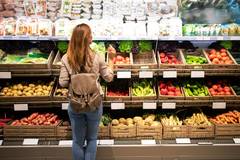“Protein Tracker” tool advances retail push away from animal produce
The Green Protein Alliance and ProVeg Netherlands have developed a “Protein Tracker” tool that helps retailers and foodservice providers calculate the relative volumes of plant-based versus animal-based proteins in their product sales or purchases. The initiative aims to shift consumer behavior toward more plant-based and more climate-friendly choices.
The tool monitors the ratio of plant-based proteins to animal-based proteins across all food categories, including nuts, legumes, and meat alternatives. Increasing the sales of vegetables, fruits, and whole grains also contributes to progress.
Around 85% of retail food sales in the Netherlands are now tracked using the Protein Tracker.
“When Dutch retailers first started their protein transition journey, there was no comparable way to measure the success of the protein transition, nor the status of the goals they had set,” Anke van’t Klooster, Protein Transition Expert at the Green Protein Alliance, tells Food Ingredients First.
“That is why we (The Green Protein Alliance and ProVeg Netherlands) developed the Protein Tracker, together with the biggest Dutch retailers.”
She stresses that the method is currently the most accurate for helping supermarkets and food service companies gain insight into the ratio of animal- to plant-based proteins in their sales or purchases.

“Not only can companies measure their progress, but they can also be compared to each other, and we can give an indication about the status of the transition within the whole retail landscape of a country.”
Dutch supermarkets, experts from the environmental NGO Natuur & Milieu, and the think tank Questionmark Foundation helped develop the tool.
Tracking the “protein split”
The Protein Tracker measures the “protein split” or the balance between animal and plant-based protein sales. It shows retailers the amounts that are actually bought, beyond what is available on the shelf, explains Van’t Klooster.
 EU-wide use of the Protein Tracker could measure the continent’s protein transition, says Van’t Klooster.“Availability does not necessarily mean that the products are actually sold a lot. There is no guarantee of success. Therefore, the monitoring should be focused on what goes over the counter in retail.”
EU-wide use of the Protein Tracker could measure the continent’s protein transition, says Van’t Klooster.“Availability does not necessarily mean that the products are actually sold a lot. There is no guarantee of success. Therefore, the monitoring should be focused on what goes over the counter in retail.”
Supermarkets use the protein sales balance to see where they stand in the transition toward more plant-based protein sales.
Van’t Klooster argues that shifting from animal-based to more plant-based proteins is the “most transformative move retailers can make toward sustainable food systems.” Plant-based proteins have a lower environmental impact, require less land and water, and increase healthier sales of plant-based foods, she notes.
Propelling protein transition
Denmark-based online supermarket, Wolt Market Denmark, recently became the first retailer outside the Netherlands to adopt the tool.
Van’t Klooster believes this marks a “significant step” in expanding the tool outside the Netherlands, and expects supermarkets in other countries to follow suit as the plant-based food market expands.
“Wolt Denmark saw how useful the Protein Tracker has been for Dutch supermarkets in gaining insights as well as taking steps toward more plant-based protein sales.” The insights support protein strategy, aid Corporate Sustainability Reporting Directive reporting, and boost internal focus on plant protein sales.
 Availability of plant-based products doesn’t guarantee success, what goes over the counter is important.She views the Protein Tracker not only as a measurement but also as a “strategic tool” for protein transition.
Availability of plant-based products doesn’t guarantee success, what goes over the counter is important.She views the Protein Tracker not only as a measurement but also as a “strategic tool” for protein transition.
“If all the retailers in Europe were to use The Protein Tracker, we could measure the status of the European protein transition as well as many new insights on how to change the protein food system. These learnings can be shared among retailers and other stakeholders to further speed up the transition nationally and internationally.”
Standardizing protein transparency
As supermarkets continue looking for verified protein balance monitoring, Van’t Klooster believes the Protein Tracker could become the standard in European retail.
“In addition, the growing consumer demand for transparency and sustainable sourcing is putting pressure on retailers to adopt tools that offer clear insights into their sales. This allows retailers to see where they stand, and where they stand compared to their competitors.”

















